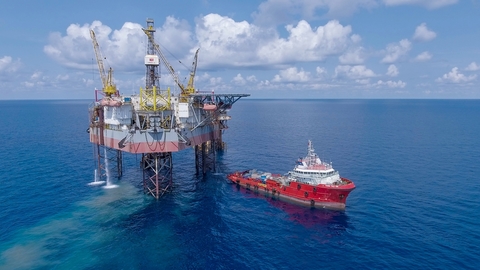
PetroVietnam has yet to commit to any spending cuts. — Photo PVN
Viet Nam’s crude oil and natural gas production face risks in light of a double-whammy of the global oil price collapse and sluggish demand due to the continued spread of COVID-19, according to Fitch Solutions.
This has triggered widespread reactions from across the globe as oil and gas firms announced significant capex cuts, reduced output targets and other cost-cutting measures in order to ride out the downturn.
Viet Nam’s State-owned oil producer PetroVietnam (PVN) has yet to commit to any spending cuts. However, PVN did concede through an official statement that its 2020 revenue was likely to be halved due to the drop-off in crude and losses incurred from some ongoing projects. PVN is also believed to have ordered its subsidiaries to prepare business scenarios for different oil price levels as it contemplates the likelihood of a protracted downturn in prices.
“Such a scenario would be highly negative for PVN’s upstream portfolio, which mostly comprises of joint-ventures with foreign entities in offshore and mature producing areas. According to industry sources, PVN’s breakeven cost per barrel is believed to be in the region of US$51 per barrel, far above the $36.3 per barrel averaged in March and also above the $43 per barrel that Brent is expected to average in 2020, according to our forecast. This risks most of the PVN’s existing output and informs our expectation for overall crude oil and natural gas production in Viet Nam to suffer year-on-year declines of 5 per cent and 1 per cent, respectively, in 2020,” Fitch said.
Capital spending cuts and final investment decision delays appear inevitable, as upstream operators come to grips with a lower oil price environment and sluggish demand, it said.
According to Fitch, many of Viet Nam’s largest oil and gas fields have large foreign ownership. For many of these firms, upstream plays in higher-risk emerging markets such as Viet Nam are outside of their core portfolio, and as such, budgeted spending in Viet Nam has the potential to be among the first to go in the event of any capex cuts.
In addition to changes in upstream outlook, Fitch has also revised down demand growth projections for Viet Nam to reflect reduced demand in light of COVID-19.
“We now expect refined fuels consumption to contract by 1 per cent in 2020, down from the previous forecast for 3 per cent expansion. The severity of reported COVID-19 spread in Viet Nam has been moderate relative to larger regional peers, although this has proven insufficient to prevent a precipitation in domestic demand.” — VNS